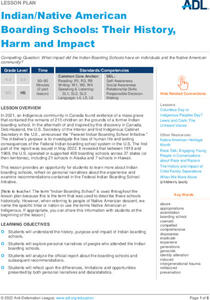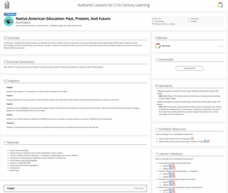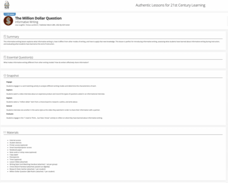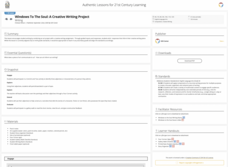Anti-Defamation League
Indian/Native American Boarding Schools: Their History, Harm and Impact
Encultureate, assimilate, or eliminate? The 2021 discovery of a mass grave of over 200 children on the site of a former Canadian Indian Boarding school led to the creation of the Federal Indian Boarding School Initiative. High schoolers...
K20 LEARN
Allotment in Indian Territory: Land Openings in Indian Territory
To understand how the allotment policy embedded in the Dawes Act, passed by the U.S. government in 1887, affected the tribal sovereignty of Native Americans, young historians examine various maps and documents and Supreme Court cases...
K20 LEARN
Native American Education - Past, Present, and Future: Assimilation
To understand the history of Native American education, high schoolers examine the record of young scholars who attended the Carlisle Indian School from 1879-1918. They also examine sources that contain information about indigenous...
Anti-Defamation League
Columbus Day or Indigenous Peoples Day?
"Columbus Day"? Indigenous Peoples' Day"? "Native Americans' Day"? The controversy over what to call the federal holiday celebrated on the second Monday in October is the focus of a lesson that asks high schoolers to consider various...
Anti-Defamation League
Analyzing Primary Source Documents to Understand U.S. Expansionism and 19th Century U.S.-Indian Relations
Historical events can be viewed from multiple perspectives. This simple truth is brought home in a lesson that examines primary source documents related to the Lewis and Clark Expedition, the Doctrine of Discovery and Manifest Destiny,...
Anti-Defamation League
Should Washington's NFL Team Change Their Name?
"What's in a name?" Is it irrelevant, as Juliet suggests in Shakespeare's play, or is nomenclature deeply significant? Young scholars weigh in on the debate by examining the controversy over the NFL's Washington, D.C. Redskins. Groups...
K20 LEARN
The K20 Chronicle, Lesson 4: Putting It All Together - Layout and Final Product
Senior Spotlight! Read all about them! Young photojournalists put together their articles and photographs, craft a layout, and publish their interviews with a senior from their high school.
K20 LEARN
The K20 Chronicle, Lesson 3: Crafting the Article
Picture your class members as photojournalists! Using their interview with a senior as a starting point, would-be photojournalists begin developing an outline for their article by examining their notes from the interview, gathering...
K20 LEARN
The K20 Chronicle, Lesson 2: How To Conduct An Interview
Young journalists learn how to prepare for an interview, conduct an interview, and craft good interview questions with follow-up questions. After they watch and analyze several interviews, class members select a senior to interview,...
K20 LEARN
The K20 Chronicle, Lesson 1: What Makes a Good Article?
Good news articles are engaging, informative, and often compelling. In the first lesson of the four-part series, young journalists analyze and evaluate news stories about former NBA player Enes Kanter Freedom. They learn about the...
K20 LEARN
Trigger Warnings - Intellectual Rights and Responsibilities: Banned Books, Censorship Part 1
"Warning: Conducting this lesson may be harmful." Such statements, called "Trigger Warnings," are the focus of a two-part lesson that looks at censorship, especially the pros and cons of trigger warnings. Class members read two articles,...
K20 LEARN
The Million Dollar Question: Informative Writing
Introduce high school freshmen to the characteristics of informative writing with a 5-day lesson that distinguishes informative writing from other modes. Scholars learn how to search for and cite reliable resources, then research and...
K20 LEARN
The Sirens: Is It a Bird or Is It a Fish?
Fish, fowl, foul fish, or foul fowl? Just what is a siren? Young scholars listen to a video clip and draw what they imagine when they hear the word "siren." After watching several videos depicting sirens, class members read "The Sirens'...
K20 LEARN
The Most Dangerous Game
Readers of "The Most Dangerous Game" must argue which of Richard Connell's characters is the protagonist or antagonist. The lesson begins with scholars reading selected passages from the story and making predictions about who they...
K20 LEARN
Windows To The Soul: A Creative Writing Project
The eyes have it in a project that combines art with creative writing. Class members list three adjectives or characteristics of a person they admire. Then draw a picture of a pair of eyes that they feel reflects these characteristics....
K20 LEARN
Writing An Argumentative Paragraph: Argumentative Writing
Learning how to craft a cogent argument based on a solid claim, supported with evidence and solid reasoning, is an important life skill. Teach middle schoolers about argumentative writing with a lesson asking them to analyze the claims,...
K20 LEARN
Writing Is Elementary, My Dear Watson: Writing Paragraphs With Evidence And Reasoning
Did Smitty do it, or is he a victim? Sleuths apply their observation and reasoning skills to build a case for an argumentative paragraph. Class members closely observe a cartoon, make a claim, cite evidence from the image, and support...
K20 LEARN
Lord of the Flies Unit, Lesson 8: In The End
To end the unit, groups use the Honeycomb Harvest strategy to show connections among a character, symbols, and themes in the novel and then create an Anchor Chart for the character that includes a symbol that best represents him. They...
K20 LEARN
Lord of the Flies Unit, Lesson 7: Good To Be Bad
The seventh lesson in the Lord of the Flies unit asks scholars to consider whether or not an individual can overcome the worst thing they have ever done. Groups read different articles related to the question, share their expertise in a...
K20 LEARN
Lord of the Flies Unit, Lesson 4: Bad to the Bone
Is the nature of humans inherently good or evil? That is the question scholars consider in the fourth lesson plan of the Lord of the Flies unit. In a Four Corners activity, they examine statements about human nature and stand by the...
K20 LEARN
Lord of the Flies Unit, Lesson 6: I've Got The Power
Readers of Lord of the Flies consider the symbols of power William Golding uses in his dystopian novel and support their choice with evidence from the text.
K20 LEARN
Lord of the Flies Unit, Lesson 3: Behind the Mask
After watching a video about masks from many cultures, class members research the history of masks and build a Driving Question Board. Individuals then create a mask for a character from The Lord of the Flies, justifying elements of...
K20 LEARN
Lord of the Flies Unit, Lesson 2: Leader of the Pack
The second lesson plan in the Lord of the Flies unit asks scholars to consider the characteristics of a good leader. After generating a list of these qualities, they annotate a passage from the novel highlighting the leadership qualities...
K20 LEARN
Lord of the Flies Unit, Lesson 1: I'm A Survivor
What three readily available things would you grab in case of an emergency? That's the question that launches a unit study of William Golding's The Lord of the Flies. After sharing their choices, class members read Golding's rationale...

























